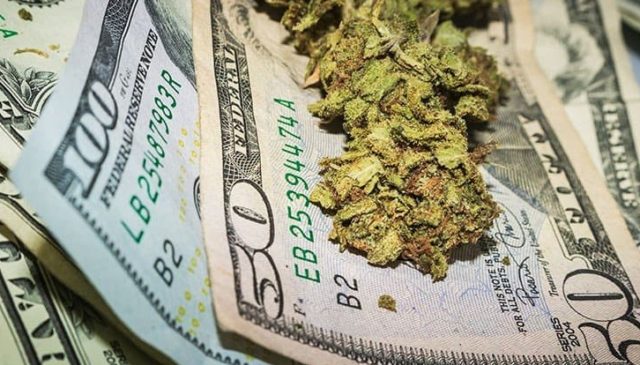
<![CDATA[
Thirty U.S. senators attached their names to the Secure And Fair Enforcement (SAFE) Banking Act of 2021, legislation that was reintroduced March 23 in the upper chamber of Congress. Among them, seven Republicans are on board.
Sens. Jeff Merkley (D-OR) and Steve Daines (R-MT) are leading the charge as primary sponsors of the bill, which would create protections for financial institutions that provide services to state-legal cannabis businesses. The Senate version of the bill comes on the heels of SAFE Banking being refiled in the House on March 18, where it carries more than 100 co-sponsors. The lower chamber overwhelmingly passed a standalone version of the bill in 2019, and then House members passed the measure two more times as part of federal coronavirus relief bills in 2020.
None of those previous efforts cleared the Senate, where there now lies new optimism with Democrats taking control of a 50-50 split via Vice President Kamala Harris representing the tiebreaker vote. In the last Congress, the SAFE Banking Act of 2019 had 35 senators signed on for sponsorship, including then-Sen. Harris, but former Majority Leader Mitch McConnell (R-KY) never acted on calendaring it for floor debate.
Many state-legal medicinal or adult-use cannabis businesses are denied access to the banking system because banks fear they may be prosecuted under federal law given the ongoing federal restrictions on cannabis, Merkley said in a press release March 23. The lack of access to bank accounts, credit cards and checks has forced some state-legal cannabis businesses to operate in cash, opening the door to tax evasion and to a dangerous pattern of robberies, including one that resulted in the murder of a store clerk in Portland, Ore., Merkley said.
“No one working in a store or behind a register should have to worry about experiencing a traumatic robbery at any moment,” Merkley said. “That means we can’t keep forcing legal cannabis businesses to operate entirely in cash—a nonsensical rule that is an open invitation to robbery and money laundering. Let’s make 2021 the year that we get this bill signed into law so we can ensure that all legal cannabis businesses have access to the financial services they need to help keep their employees safe.”
Helping motor more than $17.5 billion of legal cannabis sales in the U.S. in 2020, there were 515 banks and 169 credit unions providing services to cannabis-related businesses at the end of last year, according to Financial Crimes Enforcement Network’s (FinCEN) quarterly cannabis banking update. But, like Merkley said, not all cannabis-related businesses have access to those financial institutions, and those financial institutions don’t have guaranteed safe harbor for taking on clients who operate in a sector that is not federally legal.
Providing all state-legal cannabis businesses access to banking services would not only improve community safety, but also make it easier for Americans of color—who have long been disproportionately impacted by America’s war-on-drugs policies and generations of asset-stripping policies and practices—to access the capital necessary to participate in the merging cannabis industry, Merkley said in his release.
Daines, who did not sponsor SAFE Banking in the previous Congress, is now taking the lead for Republicans who support the reintroduced version of the bill. Perhaps influencing his sponsorship, Montana was one of four states that passed voter-approved ballot measures to legalize adult-use cannabis in the November 2020 election.
“Montana businesses shouldn’t have to operate in all cash—they should have a safe way to conduct business,” Daines said. “My bipartisan bill will provide needed certainty for legal Montana cannabis businesses and give them the ability to freely use banks, credit unions and other financial institutions without the fear of punishment. This in turn will help increase public safety, reduce crime, support Montana small businesses, create jobs and boost local economies. A win-win for all.”
To address the safety concerns resulting from state-legal businesses being shut out of banking services, the SAFE Banking Act would prevent federal banking regulators from:
- Prohibiting, penalizing or discouraging a bank from providing financial services to a state-sanctioned and regulated cannabis business, or an associated business (such as a lawyer or landlord providing services to a legal cannabis business);
- Terminating or limiting a bank’s federal deposit insurance solely because the bank is providing services to a state-sanctioned cannabis business or associated business;
- Recommending or incentivizing a bank to halt or downgrade providing any kind of banking services to these businesses; or
- Taking any action on a loan to an owner or operator of a cannabis-related business.
In addition to Merkley and Daines as the primary sponsors, the legislation is co-sponsored by Sens. Kyrsten Sinema (D-AZ), Edward J. Markey (D-MA), Alex Padilla (D-CA), Patrick Leahy (D-VT), Richard Durbin (D-IL), Ron Wyden (D-OR), Mazie Hirono (D-HI), Tina Smith (D-MN), Angus King (I-ME), Catherine Cortez Masto (D-NV), Michael Bennet (D-CO), Robert Menendez (D-NJ), Jon Tester (D-MT), Jacky Rosen (D-NV), Kevin Cramer (R-ND), Dan Sullivan (R-AK), Kirsten Gillibrand (D-NY), Elizabeth Warren (D-MA), Chris Murphy (D-CT), Gary Peters (D-MI), Bernie Sanders (I-VT), Brian Schatz (D-HI), Patty Murray (D-WA), Amy Klobuchar (D-MN), Rand Paul (R-KY), Bill Cassidy (R-LA), Cynthia Lummis (R-WY) and Lisa Murkowski (R-AK).
]]>
